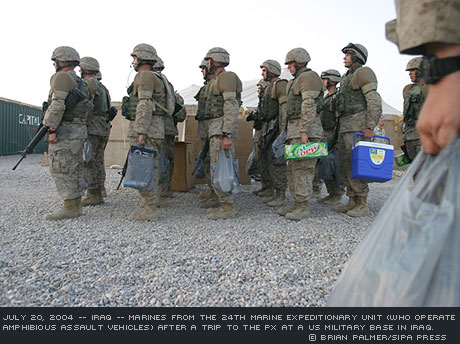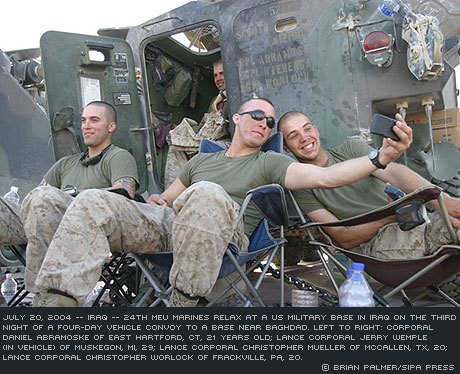Convoy
to Iraq
It took several slow-driving days to get here from Kuwait. The convoy
I traveled with, a collection of amphibious assault vehicles, light-armored
reconnaissance vehicles, and heavy tanks -- all hauled by a fleet
of tractor trailers -- hop-scotched from US military camp to US military
camp. The caravan moved during the day, stopping frequently for checkpoints,
flats, and other problems. The Marines rode in the back of their combat
vehicles wearing full body armor.
In the evening, the convoy pulled into staging areas, big parking
lots full of military vehicles as well civilian trucks carrying water,
food, and equipment. The noncommissioned officers -- sergeants, staff
sergeants and gunnery sergeants -- wrangled the 40 or so young Marines
into formation, where they assigned them in pairs to walk security
patrol through the night, and announced the departure time for the
following morning. Gunnery Sergeant David Myers would then march the
rest of the crusty young men to the chow hall, everyone still wearing
flak jackets and helmets. These Marines always wear flak jackets and
helmets unless actually eating, showering, or sleeping. That's part
of Marine discipline, Staff Sergeant Robert Moyer told me. They need
to get used to the discomfort now, because they won't be able to yank
off their gear up north.
The next morning, the vehicles pulled out of the staging area, drove
through a serpentine of barbed wire and concrete barriers, then across
a dusty stretch of land and past an improvised checkpoint into Iraq.
Very uneventful, reassuringly so. Along the way, small children dashed
up to the side of the road and waved or gestured for the Marines to
toss them food by putting the fingertips of their right hands to their
mouths. But on the same highway just a few more kilometers into Iraq,
there was a small contingent of British troops, some in vehicles and
others kneeling next to berms of sand, scanning the horizon, rifles
ready.
In-country
"Welcome to fucking Iraq," Gunny Myers cracked at the next
formation of his Marines, the first one on the Iraqi side of the border.
Later, after they had stripped off their body armor and salt-streaked
shirts, I asked the crew of one vehicle what it felt like to be in-country.
"Hot," said one, with purposeful understatement. "It's
a little warm here,” joked another. These are young and gung-ho
guys, 20 and 21 years old, never been in combat. They deploy blasé
tough-guy attitudes, for me, I assume, and possibly for each other.
"I'm not saying it's going to be like a day at Six Flags,"
one Marine adds, but he's psyched to finally be in Iraq and to be
on the verge of combat. Lance Corporal Jerry Wemple, at 29 the oldest
Marine on his vehicle, is the only on the vehicle who deployed to
Iraq last year. He offered a cautionary note. "I don't think
they're totally grasping what it's going to be like," he said
diplomatically. Older Marines I have spoken to show a hardened matter-of-factness
about what they do. I ask Staff Sergeant Moyer how he felt about heading
to Iraq. "I just try to focus on the job at hand. Whatever happens,
happens," he told me as we rumbled north on MSR Tampa, the highway
from Kuwait to Iraq.
But 24th MEU Marines have also been given talking points from higher-ups
to use on the media. "Be the cocky obnoxious bastards you can
be," commanded General James Mattis at a welcoming briefing their
first week at Camp Virginia. Tell the press nothing negative. If they
ask about the heat, tell them "no problem," tell them you're
thinking of buying property on the Euphrates. Of casualties, he said,
"we shall grieve in private." But, he added, make sure to
tell those reporters, "watch us tomorrow."
"Contact is likely," Gunnery Sergeant Myers told the men
on the last day of the convoy, the last push north. "Ninety-nine
percent of the people want us here. The other one percent we're going
to fucking kill," he shouted. "Stay sharp the rest fucking
way. Trust your training -- and trust your fucking senior Marines."
There was no contact, no small arms fires or IEDs. But there was no
warm greeting from local folks, at least as far as I saw from my perch
atop an amphibious assault vehicle, only hard stares and a few bemused
glances as the convoy trundled past shops, roadside vendors and homes
in this city where they will spend the next six to seven months.
|


